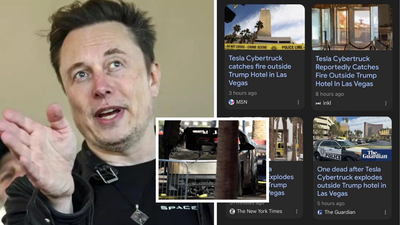[ad_1]
Elon Musk has launched a scathing attack on legacy media over their coverage of the Tesla Cybertruck explosion outside the Trump Hotel in Las Vegas on New Year’s Day. Musk accused outlets of spreading misinformation, misleading audiences into believing the Cybertruck malfunctioned and exploded. He also called the Associated Press (AP) “Associated Propaganda.”
The explosion, which involved fireworks, gas tanks, camping fuel, and a detonation system, was confirmed to be a likely terrorist attack. The Cybertruck, according to Musk, contained the explosion and directed the blast upwards, sparing the hotel lobby’s glass doors from damage. Yet, many media reports framed the incident as a product failure, sparking outrage among Musk’s followers.
One user on X (formerly Twitter) wrote, “Media headlines are misleading audiences, suggesting the Cybertruck caught fire or exploded due to a malfunction. The truth is that explosives were placed in the back and intentionally detonated, likely as part of a terrorist act.” Musk replied, “You don’t hate the legacy media enough.”
Another user suggested Musk sue outlets for defamation, saying, “These headlines are sabotaging Tesla’s brand by making people think it caught on fire. There’s about 1 Tesla fire for every 130 million miles traveled. Other cars have 1 every 18 million miles.” Musk responded, “Maybe it is time to do so.”
Musk’s feud with AP
Musk specifically targeted the Associated Press, accusing the news agency of bias in its reporting of the Cybertruck incident. He mocked AP’s credibility, calling it “Associated Propaganda,” amplifying criticism of the agency’s headline choices and editorial tone.
Tesla defenders speak out
Supporters on X have been quick to defend Tesla and its vehicles, pointing out the Cybertruck’s ability to withstand such a powerful explosion. “The build quality of the Cybertruck prevented even greater destruction. This is a testament to its design, not a failure,” one user posted.
Germany car attack
Musk’s criticism of legacy media isn’t new. In a previous incident in Germany, the AP faced backlash for a headline stating, “A car has driven into a group of people at a Christmas market in Germany.” Critics accused the agency of downplaying the driver’s role, as footage later revealed that the Saudi national behind the wheel was arrested at the scene. While this controversy is unrelated to the Cybertruck incident, it underscores Musk’s broader critique of what he sees as biased and misleading journalism.
[ad_2]
Source link








